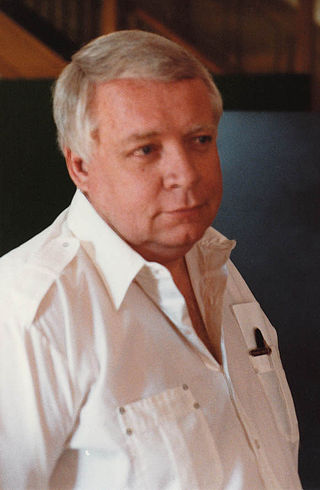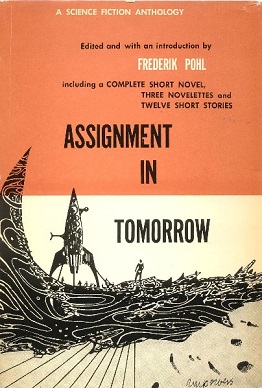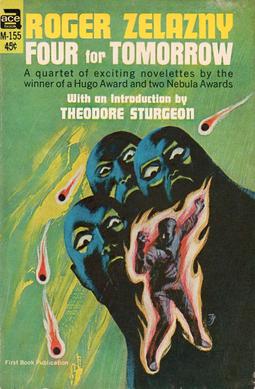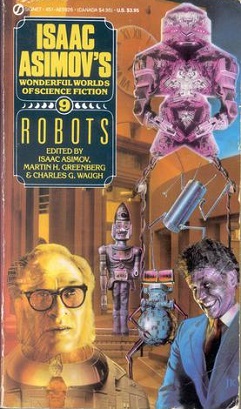
Algirdas Jonas "Algis" Budrys was a Lithuanian-American science fiction author, editor, and critic. He was also known under the pen names Frank Mason, Alger Rome in collaboration with Jerome Bixby, John A. Sentry, William Scarff, and Paul Janvier. In 1960, he authored Rogue Moon, a novel.

Sam Moskowitz was an American writer, critic, and historian of science fiction.

The Rest of the Robots is a collection of eight short stories and two full-length novels by American writer Isaac Asimov, published in 1964. The stories, centred on positronic robots, are all part of the Robot series, most of which take place in the Foundation universe. Another collection of short stories about robots, I, Robot, was re-published in the previous year, which is why Asimov chose to title the collection as The Rest of the Robots. None of the short stories in this collection were in I, Robot, however all of them were later included in The Complete Robot, and both novels about Elijah Baley were also published separately.
The Golden Age of Science Fiction, often identified in the United States as the years 1938–1946, was a period in which a number of foundational works of science fiction literature appeared. In the history of science fiction, the Golden Age follows the "pulp era" of the 1920s and 1930s, and precedes New Wave science fiction of the 1960s and 1970s. The 1950s are, in this scheme, a transitional period. Robert Silverberg, who came of age then, saw the 1950s as the true Golden Age.
Jove Books, formerly known as Pyramid Books, is an American paperback and eBook publishing imprint, founded as an independent paperback house in 1949 by Almat Magazine Publishers. The company was sold to the Walter Reade Organization in the late 1960s. It was acquired in 1974 by Harcourt Brace which renamed it to Jove in 1977 and continued the line as an imprint. In 1979, they sold it to The Putnam Berkley Group, which is now part of the Penguin Group.

First Flight: Maiden Voyages in Space and Time is an anthology of science fiction short stories edited by Damon Knight, first published in paperback by Lancer Books in August 1963. It is a compilation of the first published stories of ten authors in the genre. It was reprinted in November 1966 and reissued as Now Begins Tomorrow in November 1969 by the same publisher. An expansion of the work, retaining Knight's introduction and adding the initial stories of ten additional authors, was later prepared by Martin H. Greenberg and Joseph D. Olander and published as First Voyages by Avon Books in May 1981.

In Search of Wonder: Essays on Modern Science Fiction is a collection of critical essays by American writer Damon Knight. Most of the material in the original version of the book was originally published between 1952 and 1955 in various science fiction magazines including Infinity Science Fiction, Original SF Stories, and Future SF. The essays were highly influential, and contributed to Knight's stature as the foremost critic of science fiction of his generation. The book also constitutes an informal record of the "Boom Years" of science fiction from 1950 to 1955.

Satellite Science Fiction was an American science-fiction magazine published from October 1956 to April 1959 by Leo Margulies' Renown Publications. Initially, Satellite was digest-sized and ran a full-length novel in each issue with a handful of short stories accompanying it. The policy was intended to help it compete against paperbacks, which were taking a growing share of the market. Sam Merwin edited the first two issues; Margulies took over when Merwin left, and then hired Frank Belknap Long for the February 1959 issue. That issue saw the format change to letter size, in the hope that the magazine would be more prominent on newsstands. The experiment was a failure and Margulies closed the magazine when the sales figures came in.

Science Fiction Inventions is a reprint anthology of science fiction stories, edited by Damon Knight and published by Lancer Books as an original paperback in 1967.

Assignment in Tomorrow is an anthology of science fiction stories edited by American writer Frederik Pohl. Originally published in hardcover by Hanover House in 1954 with jacket art by Richard M. Powers, it was reprinted in paperback by Lancer Books in 1972.

Explorers of the Infinite: Shapers of Science Fiction is a work of collective biography on the formative authors of the science fiction genre by Sam Moskowitz, first published in hardcover by the World Publishing Company in 1963, and reprinted in trade paperback in 1966. A photographic reprint of the original edition was issued in both hardcover and trade paperback by Hyperion Press in 1974. Most of its chapters are revised versions of articles that initially appeared in the magazines Satellite Science Fiction and Fantastic Science Fiction Stories from 1958-1960.

First Voyages is an anthology of science fiction short stories edited by Damon Knight, Martin H. Greenberg and Joseph D. Olander, first published in paperback by Avon Books in May 1981. It is a compilation of the first published stories of twenty prominent authors in the genre, and an expansion of Knight's earlier First Flight: Maiden Voyages in Space and Time, which covered ten of the same stories and authors.

Modern Masterpieces of Science Fiction is an anthology of science fiction short stories, edited by Sam Moskowitz. It was first published in hardcover by World Publishing Co. in 1965, and reprinted by Hyperion Press in 1974. It was split into three separate paperback anthologies published by MacFadden-Bartell; Doorway Into Time (1966), The Vortex Blasters (1968) and Microcosmic God (1968); the paperback editions omitted Moskowitz's introduction and the story by Robert Bloch.

Four for Tomorrow is the first story collection by Roger Zelazny, published in paperback by Ace Books in 1967. British hardcover and paperback editions followed in 1969, under the title A Rose for Ecclesiastes. The first American hardcover was issued in the Garland Library of Science Fiction in 1975. A French translation appeared in 1980. Paperback reissues continued from Ace and later from Baen Books into the 1990s.

A Treasury of Science Fiction is an American anthology of science fiction short stories edited by Groff Conklin. It was first published in hardcover by Crown Publishers in 1948, and reprinted in March 1951. A later edition was issued by Bonanza Books/Crown Publishers in March 1980. An abridged paperback version including eight of its thirty stories was published by Berkley Books in July 1957 and reprinted in January 1958 and January 1965.

Robots is an anthology of science fiction short stories edited by Isaac Asimov, Martin H. Greenberg and Charles G. Waugh as the ninth volume in their Isaac Asimov's Wonderful Worlds of Science Fiction series. It was first published in paperback by Signet/New American Library in April 1989. The first British edition was issued in paperback by Robinson in 1989.

Nebula Award Stories 3 is an anthology of award-winning science fiction short works edited by Roger Zelazny. It was first published in the United Kingdom in hardcover by Gollancz in November 1968. The first American edition was published by Doubleday in December of the same year. Paperback editions followed from Pocket Books in the U.S. in February 1970, and Panther in the U.K. in November 1970. The American editions bore the variant title Nebula Award Stories Three. The book was more recently reissued by Stealth Press in hardcover in June 2001. It has also been published in German.

Nebula Award Stories Two is an anthology of science fiction short stories edited by Brian W. Aldiss and Harry Harrison. It was first published in hardcover by Doubleday in September 1967, with a Science Fiction Book Club edition following in November 1969. The first British edition was published by Gollancz in 1967, under the variant title Nebula Award Stories 1967. Paperback editions followed from Pocket Books in the U.S. in September 1968, and Panther in the U.K. in 1970. The Panther edition bore the variant title Nebula Award Stories 2. The book was more recently reissued by Stealth Press in hardcover in September 2001. It has also been published in German.

Nebula Award Stories Sixteen is an anthology of award winning science fiction short works edited by Jerry Pournelle and John F. Carr. It was first published in hardcover by Holt, Rinehart and Winston in August 1982; a paperback edition was issued by Bantam Books in September 1983. British editions were issued by W. H. Allen (hardcover) and Star (paperback) in 1983; the latter under the variant title Nebula Winners Sixteen.

The Best of Lester del Rey is a collection of science fiction short stories by American author Lester del Rey. It was first published in paperback by Del Rey/Ballantine in September 1978 as a volume in its Classic Library of Science Fiction, with a Science Fiction Book Club hardcover edition following in December of the same year. It was reprinted by Del Rey Books in March 1986, February 1995, and June 2000. The book has been translated into German.


















